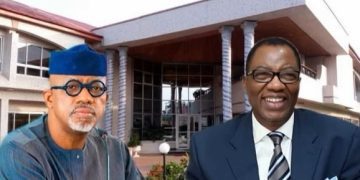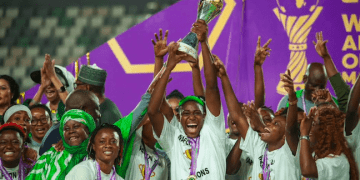 •The Chairman of APC Governorship Campaign Council for Kogi State and Governor of Ogun State, Prince Dapo Abiodun CON, monitoring election at Lokoja, Kogi State yesterday.
•The Chairman of APC Governorship Campaign Council for Kogi State and Governor of Ogun State, Prince Dapo Abiodun CON, monitoring election at Lokoja, Kogi State yesterday.
The National Secretariat of the APC has warned against any attempt to truncate the will of the people in Kogi State while urging the Independent National Electoral Commission (INEC) to remain steadfast in the commitment to its mandate.
The party, in a statement, signed by Felix Morka, its National Publicity Secretary, said it is clear that the candidate of the All Progressives Congress (APC), Usman Ododo, is coasting to spectacular victory in the Kogi gubernatorial election, it therefore called on the Independent National Electoral Commission (INEC) to protect the integrity of the legitimate votes of the Kogi electorate.
The statement reads: “Announced and uploaded results, so far, show our Candidate maintaining a landslide lead in Kogi West and Central, with a competitive showing in Kogi East.
“We are keenly aware of intense pressure, including violent threats on INEC staff, by agents and supporters of trailing opposition parties aimed at unduly influencing or disrupting ongoing collation of results in the state.
“We urge INEC to stand fast in discharge of its constitutional duty to deliver free, fair and credible election in the state, and ensure that the freely exercised will of the Kogi electorate prevails”, the statement noted.
However, the party’s governorship candidate in the Saturday governorship election, Usman Ododo has won 11 local government areas of the State as announced so far by the Independent National Electoral Commission(INEC).
Kogi APC won in Okehi, Ijumu, Okenne, Yagba West, Adavi, Ajaokuta, Ogorimagongo, Mopamoro, Bassa, Kogi Koto Karfe and Kabba/Bunnu council areas.
The Social Democratic Party(SDP) candidate, Muri Ajaka, however, won in six local governments – Dekina, Ankpa, Olamaboro, Omala, Ofu and Idah.
Meanwhile, members of the All Progressives Congress (APC) in Dekina and Olamaboro local government areas of Kogi State have protested what they call the daylight robbery of their votes during the election conducted yesterday.
In a random sampling of opinions across the polling units within the two local governments, many members of the ruling party lamented the brazen robbery and the open display of thuggery perpetuated by hoodlums loyal to the Social Democratic Party (SDP).
Revelation from available iREV data on the Independent National Electoral Commission’s (INEC) portal, shows that there were significant electoral discrepancies in the elections in the two local governments. The data shows a blatant case of overvoting and manipulation of results in favour of the SDP candidate, Muritala Ajaka.
According to the uploaded IREV results, there are clear instances of overvoting, where the number of votes cast surpasses the number of accredited voters, raising questions about the integrity of the voting process.
Additionally, there have been reports of bypassing the Biometric Voter Accreditation System (BVAS) and tampering with result sheets, pointing to a systematic attempt to skew the election results in favour of the SDP.
The severity of the electoral malpractices has led to calls for the cancellation of votes in the Dekina and Olamaboro local government areas where aggrieved APC members argue that the irregularities have compromised the fairness and transparency of the election.
This was buttressed with the photograph of a falsified result sheet that has gone viral, showing discrepancies between accredited voters and the final vote counts.
A member of the APC who insisted that the picture is a clear evidence of rigging, urged the Independent National Electoral Commission (INEC) and the police to take immediate action to address these allegations and ensure that the will of the people is not truncated, especially in the two local governments.
He said: “The credibility of the electoral process is at stake. Decisive measures should be taken to restore public trust and uphold the principles of democracy.”
In the same vein, the Socio-Economic Rights and Accountability Project (SERAP) urged the INEC Chairman, Professor Mahmood Yakubu, “to promptly establish a joint, credible, transparent, effective, and broad-based investigation into the allegations.”
Urging the IGP to “identify, arrest, name and shame the suspected perpetrators and their sponsors of these grave human rights crimes”, SERAP said the police and INEC must ensure effective prosecution of the riggers and thugs, regardless of their political status or affiliations.
In the letter signed by its deputy director Kolawole Oluwadare, SERAP said: “If INEC is to live up to its constitutional and statutory responsibilities, it must take bold and effective measures to combat the culture of impunity for electoral bribery and violence in the country.
“The recurring cases of electoral bribery and violence make a mockery of Nigeria’s electoral process and participatory democracy. INEC must acknowledge its own limitations and now embrace a transparent, credible, inclusive and broad-based investigation into the allegations of grave electoral offences in Kogi, Imo and Bayelsa states.”
“Electoral integrity is critical to a legitimate democracy. When the integrity of that process is compromised, the legitimacy of our government and the public confidence in our public institutions is seriously undermined.
“The right to vote is fundamental and is the essence of a democratic society, and any restrictions on that right strike at the heart of representative government. Nigerians should have the final say in the election of governmental officials. Persistent cases of bribery and violence in the country’s elections gravely violate Nigerians’ right to vote, which is central to the effective participation of every citizen.
“Unless there is a transparent, effective, credible, inclusive and broad-based investigation into these allegations, and perpetrators and their sponsors are named and shamed and brought to justice, impunity for these electoral crimes will continue. And citizens will continue to lose confidence in the electoral process.”









































